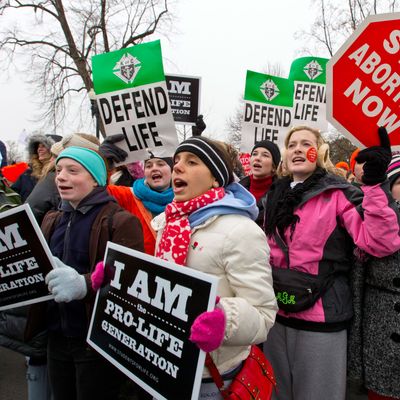
The old Republican cliché is that the party is a “three legged stool,” the three legs being social conservative, foreign-policy hawks, and economic conservatives. But events since the election have made it clear that the GOP is not an equal partnership. Defense hawks like Bill Kristol are learning what happens when their beloved military budget gets in the way of tax cuts. Now it is dawning on social conservatives that they, too, are due for a swift kick to the groin.
The release of the Republican National Committee’s official after-action report on the election has codified the response of the Republican elite, calling for a swift jettisoning of the party’s opposition to gay rights and immigration reform. Social conservatives are understandably miffed. (Matt Lewis and Ross Douthat have sharp conservative replies.) The report declares, “We are not a policy committee,” and uses this as a reason to avoid a general appraisal of the party platform, but urges Republicans to move left on those two things anyway.
That might seem like a blatant contradiction. But if you think of politics as “stuff you do to win elections” and policy as “stuff you do when you win elections,” it makes perfect sense. Exploiting fear of gays and undocumented immigrants is a part of the GOP’s political strategy. It’s not really a big part of its policy agenda. Regressive tax cuts and lax business regulation is not a platform for winning elections, it’s what you do when you win an election. “What’s the Matter With Kansas?” may oversimplify things, but it carries some essential truths.
The RNC report not only avoids policy debates on economics, it frames the political dilemma in a way as to favor its preferred outcome. The report quotes surveys showing that voters viewed the party as “scary,” “narrow minded,” and “out of touch.” “Does anyone notice what is missing?” asks Pete Spilakos at the social conservative journal First Things, “Oh, yeah, too pro-rich.” Indeed, the major theme of the 2012 election was that Republicans represented the interests of the rich over the middle class.
But when you’re overburdened with ideological baggage, you’re not necessarily going to throw away the heaviest thing you’re carrying. You’re going to throw away the thing you want the least. For the people who run the Republican Party, that’s social issues.
Part of the reason Republicans can chart this course is not only that its elite share this hierarchy of preferences; there’s also a basic imbalance in the structure of its coalition. Republican voters are distinctly more moderate than the party line on issues of taxes and spending. But they have no organized representation within the party.
Social conservative organizations are fully onboard with the orthodox conservative economic agenda, which they have come to define in moralistic terms. The party’s most prominent social conservative activist is Ralph Reed, a buddy of Jack Abramoff and Grover Norquist — which is to say, a man whose interests run toward the pecuniary. The party’s economic activists, on the other hand — Norquist, the Club for Growth, the Koch Brothers, and various donors — are perfectly willing or even eager to chuck the social conservatives overboard.
There certainly are constituencies within the party complaining about the RNC’s call for moderation on gay rights and immigration. But those same constituencies would also complain about abandoning the party’s anti-tax absolutism or opposition to universal health insurance.






























